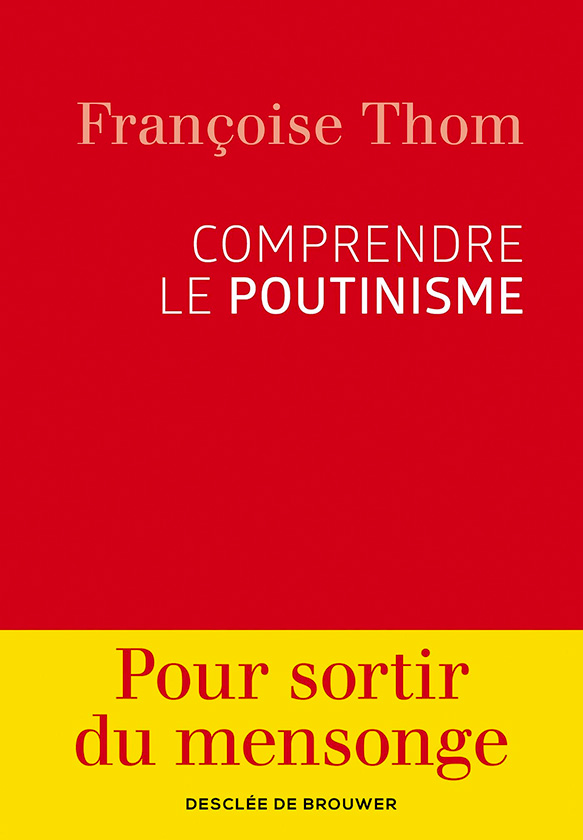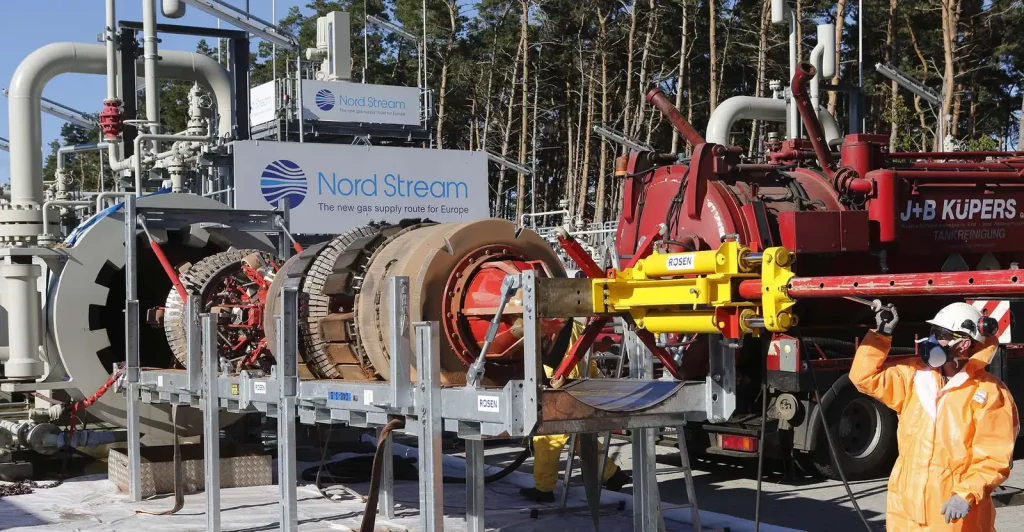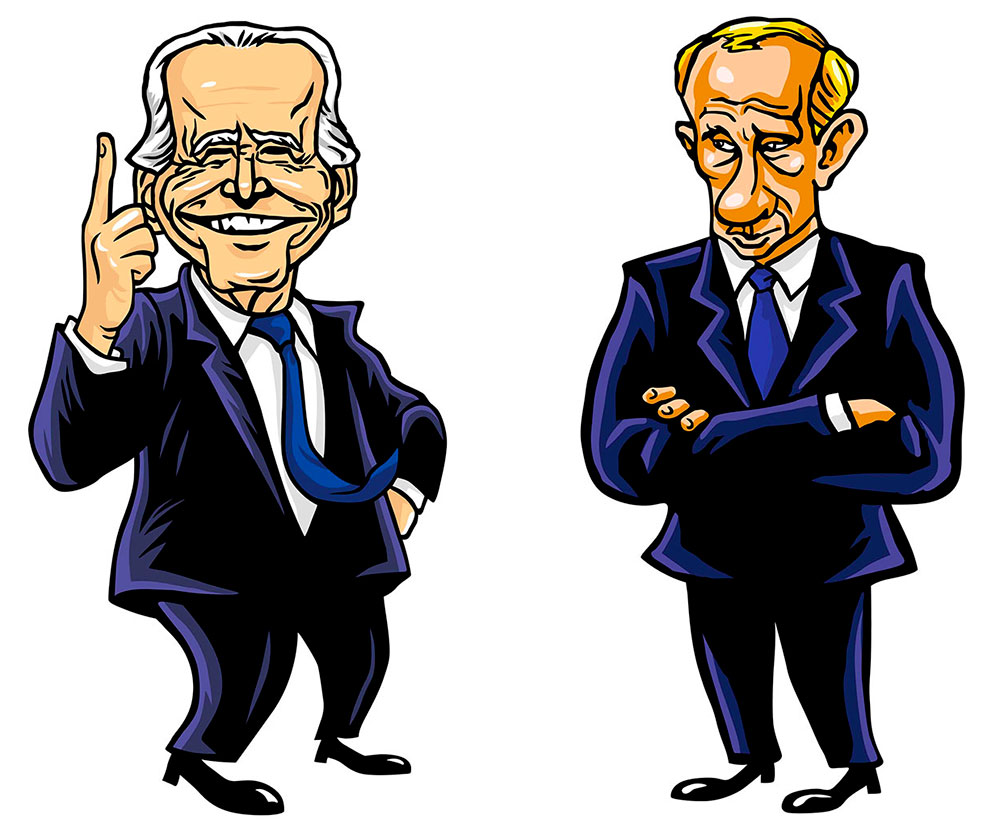Until very recently, Chancellor Merkel kept repeating that Nordstream-2 was a purely commercial project, devoid of any political implications. This insistence by Westerners on seeking immediate material benefits, while showing an abysmal myopia in the face of the long-term consequences of decisions taken, has been skilfully exploited by the Kremlin since Lenin. The Russian rulers reason in the opposite way: economic aspects are secondary, only the agenda of power counts, which does not vary.[1]
By Dr Françoise Thom — DeskRussia — September 24, 2021 —
Let’s attend for a moment the Kremlin’s tough school and learn to discern long-lasting strategies.


The Nordstream project goes back to 2000, when Vladimir Putin, the newly elected Russian president, solemnly proposed a mutually beneficial “energy partnership” to Europe, especially Germany. He launched the idea of a gas pipeline that would link Germany directly to Russia through the bottom of the Baltic Sea; as a sine qua non condition for the realization of this “partnership”, he demanded, already at that time, that the route of the future gas pipeline bypass Ukraine: it was the first manifestation of the strategy of economic asphyxiation of this country pursued by Putin until today. In 2009 an article entitled “The steel staples of Eurasia” exposes the Russian geopolitical vision inspiring the Nordstream project. “The whole short history of the existence of Eastern Europe after the collapse of the socialist bloc shows once again that the elites of these [Eastern European] countries will never pursue an independent foreign policy. Therefore, for Russia these countries cannot be equal partners, which have to be treated with respect.” Nordstream and Southstream “can contribute to destroy the emerging ligaments in the Belarus-Poland-Ukraine triangle.” The aim of Nordstream is “to bring order to the geopolitical configuration of Eastern Europe”. In particular, “Poland will begin to receive Russian gas not via the territory of Belarus, but from Germany. Thus Poland will cease to be a transit country,” which will lead to “a better understanding of the geopolitical and geo-economic realities of the modern world by the Polish elite”.

Work on the Nord Stream-1 pipeline began at the end of 2005 and was completed by 2012. Construction of the Nord Stream-2 pipeline, designed to double the gas transport capacity, which mostly follows the same route as Nord Stream-1, began in April 2018, despite strong opposition from Central European countries, especially Poland. Work was suspended in December 2019 due to US sanctions.
On July 21, 2021, Angela Merkel reached a compromise with Joe Biden on Nord Stream-2. The United States will not prevent the completion and commissioning of the pipeline, but reserves the right to impose sanctions in the future if Russia tries to use energy as a weapon or engages in aggressive activities against Ukraine and other countries. The Germans, for their part, say they will oppose Moscow’s destabilizing actions at both the national and European levels.
This American retreat was perceived in Moscow as a huge triumph. “No doubt there is a winner in this story, and this winner iis Gazprom and the Kremlin behind it. At the moment, top managers and officials are rubbing their hands and reminding the Europeans of the lost court cases, of all past attempts to block the construction of Nord Stream 2, to introduce quotas and revise prices. At the same time, Russia has trounced Europe by its own rules.”
And indeed, Moscow has many reasons to gloat. Let’s take stock of the advantages that the Kremlin expects to gain from the new situation, according to the reports published in the Kremlin-friendly press:

First, the completion of Nordstream 2 “has dealt a serious blow to the entire Western sanctions system.” Second, the deal has put Ukraine on a collision course with the United States:
“Kiev politicians even took the liberty of severely criticizing the United States and Germany for the deal, which angered Washington; this is probably why Biden gave Zelensky an extremely cold reception during the Ukrainian leader’s U.S. tour.”
Ukraine will be forced to give up sovereignty to avoid freezing in winter: “Ukraine must prepare to crawl for Russian gas,” headlined RIA Novosti on July 28 . Moreover, the completion of Nordstream 2 “removes the sword of Damocles hanging over Moscow’s head”. Indeed, until now the West threatened to stop the construction in case of Russian aggression against Ukraine. “The threats to prevent Moscow from taking measures to protect its national interests are now lifted.”
And even the insistence of Western countries on maintaining gas transit through European countries can work to Moscow’s advantage by allowing it to drive a wedge between Ukraine and Poland: “To fulfill its contractual obligations in Europe, Gazprom must sell about 200 BCM (billion cubic meters of gas) per year to the EU. And the infrastructure it has today, given the current restrictions, only allows the transit of 160 billion. The remaining 40 will have to go through another country. There are two options here — either through Poland or through Ukraine. And here it gets interesting. If the Poles continue to insist ‘on respecting Ukraine’s interests’, then Russia will have to ‘supply gas via Kiev’, since exactly 40 BCM per year is the volume ‘guaranteed’ by the agreement with Ukraine. In this case, Warsaw is deprived of its transit revenues. […] Thus, the Polish leadership is faced with a choice: either foreign policy and support for the Ukrainian partner, or their own wallet.” Gazprom has already told the Ukrainians that the new 15-year transit contract, worth 45-50 BCM per year, will only be signed if they give up using the Yamal-Europe pipeline (just over 30 BCM of gas), i.e. on the condition that Ukraine enters into a conflict with Poland. “The main thing is that Ukraine is committed to play against Poland”.
Nordstream2 will also provide the Kremlin with a pretext to militarize the Baltic. Indeed, Moscow proposes to equip the Russian Baltic fleet with diesel-electric submarines, aircraft and coastal complexes under the pretext of ensuring the security of the gas pipeline.
For the long-term perspective, let’s go back to the 2009 analysis quoted above: “Nordstream will allow Germany to become not only the final recipient of Russian gas, but also the main transit country, which will considerably strengthen the geopolitical link between Russia and Germany and serve the cause of the true unification of Eurasia into a single financial and economic entity.”
Thus Nordstream cements the German-Russian couple through which Moscow intends to dominate the Eurasian continent: “The collapse of the EU in its present US-centric form will lead to a strengthening of the influence of Germany — not the US — and is therefore beneficial for Russia. (…) This is why Russia is helping Germany to become a European leader.” Germany, firmly held on a leash by Nordstream, will become the main vehicle for the finlandization of the rest of Europe. The Kremlin is already so convinced that it will control Germany no matter what happens, that the prospect of the anti-Russian environmentalist Annalene Baerbok as German Foreign minister, in the event of a coalition between the SPD and the Greens, is not a cause for concern: she “will not be able to completely spoil relations with the Russian leadership, because the last word will always belong to the more pragmatic ‘top comrades’.”
Certainly in the immediate future “there are still obstacles: it is necessary to remove Nordstream 2 from the European legislation” which provides for “access to the third party”, that is to say that any European gas pipeline must be open to several suppliers: to circumvent this obstacle one can call on Rosneft which “will buy gas from Gazprom and will supply it further to Europe with a minimum profit, filling the remaining 50% of the pipe“. In addition, Gazprom must obtain certification for the new pipeline. To force the hand of the Europeans, Gazprom has been playing a dangerous game since the spring, which shows how Russia already feels it has the wind in its sails. This “special operation” consists of gradually reducing gas deliveries to the European market and selling the gas contained in storage facilities in Europe. As a result, gas prices are soaring and there is a real danger that by winter gas reserves will be clearly insufficient to meet demand. The Germans are now wondering whether they made a strategic mistake by giving Gazprom control over particularly important gas storage facilities in Germany in 2014. “If heavy frosts occur, the situation will become dramatic,” reads an article titled “Gazprom has brought the Germans to their knees”. “Russian President Vladimir Putin said in early September that countries with long-term contracts for Russian gas, unlike the ‘smart guys in the European Commission,’ can ‘rub their hands’ because they are buying it cheaper in the face of rising global energy prices… Gazprom sees this as a positive factor for the Europeans not to put a spanner in the works and launch the pipeline as soon as possible.” “In this way, Gazprom encourages the Europeans to issue all the necessary certificates and permits for the commissioning of Nord Stream 2 without making any fuss,” according to expert Igor Yushkov.
If, God forbid, the next winter is harsh, Western Europeans will start to feel the weight of the Russian yoke, and they will remember too late the warnings of Eastern Europeans to which they turned a deaf ear.
See also :
[1] See also : « Le partenariat énergétique entre l’Union Européenne et la Russie par Françoise Thom in DeskRussie (2000-12-14) and « Le Nord Stream 2, un « projet économique », vraiment ? » by Dr Françoise Thom in DeskRussie (2021-09-24)
Françoise Thom’s publications on DeskRussia (2021)

Que signifie l’ultimatum russe aux occidentaux ? in DeskRussie (2021-12-30)
What Does the Russian Ultimatum to the West Mean? in DeskRussia (2021-12-30)
Les occidentaux au pied du mur : comment faire face à un maître chanteur in DeskRussie (2021-12-14)
The West under the Gun: how to Deal with a Blackmailer in DeskRussia (2021-12-15)
Le boomerang de l’obscurantisme : le cas du Covid in DeskRussie (2021-12-10)
The Boomerang of Obscurantism: the Case of Covid in DeskRussia (2021-12-10)
Bélarus, Ukraine : attaques hybrides contre l’Europe in DeskRussie (2021-11-13)
The Migration Crisis: the Other Side of the Hybrid war Against Europe in DeskRussia (2021-11-13)
Le retour de l’utopie au pouvoir : le tournant du régime poutinien in DeskRussie (2021-11-12)
The Return of Utopia to Power: The Turning Point of Putin’s Regime in DeskRussia (2021-11-12)
La destruction des âmes par la propagande dans la Russie poutinienne in DeskRussie (2021-10-22)
The Destruction of the Soul in Putin’s Russia in DeskRussia (2021-10-22)
Le « partenariat énergétique » avec la Russie : les leçons du passé, les dangers de l’avenir in DeskRussie (2021-10-08)
The “Energy Partnership” With Russia: Lessons from the Past, Dangers for the Future in DeskRussia (2021-10-08)
Le partenariat énergétique entre l’Union Européenne et la Russie in DeskRussie (2021-09-24)
Le Nord Stream 2, un « projet économique », vraiment ? in DeskRussie (2021-09-24)
Nordstream-2, An economic project, did you say ? in DeskRussia (2021-09-25)
À la mémoire de Jerzy Targalski (1952-2021) in DeskRussie (2021-09-24)
Les conséquences du retrait américain d’Afghanistan vues de Russie : l’impact en Europe, le sort de l’OTAN in DeskRussie (2021-09-08)
The consequences of the American withdrawal from Afghanistan as seen from Russia: The impact in Europe, the fate of NATO in DeskRussia (2021-09-08)
Un docteur Folamour au Kremlin ? in DeskRussie (2021-08-21)
A Dr Strangelove in the Kremlin? in DeskRussia (2021-08-21)
La Russie devant le guêpier afghan in DeskRussie (2021-07-16)
Russia: Facing the Afghan Wasp Nest in DeskRussia (2021-07-16)
Décrypter la politique européenne du Kremlin in DeskRussie (2021-07-06)
Deciphering the European Policy of the Kremlin in DeskRussia (2021-07-06)
Poutine et ses courtisans : un rapport cavalier avec l’histoire in DeskRussie (2021-07-04)
Putin and his Courtiers: a Cavalier Relationship With History in DeskRussia (2021-07-04)
Pourquoi Staline refusait-il de croire à une attaque allemande ? in DeskRussie (2021-06-16)










